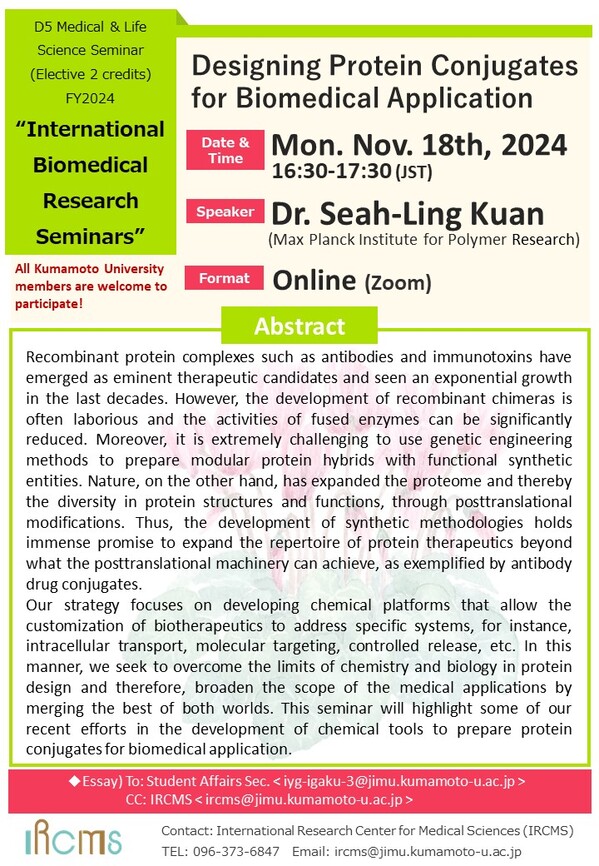- HOME
- News & Events
- [Nov. 18] D5 Seminar-Dr. Seah-Ling KUAN (Max Planck Institute for Polymer Research)
News & Events
[Nov. 18] D5 Seminar-Dr. Seah-Ling KUAN (Max Planck Institute for Polymer Research)
October 22 2024
The "D5 Medical & Life Science Seminar" course will be offered by International Research Center for Medical Sciences (IRCMS). It will run from May 2024 to March 2025, with lectures given by scientists who are affiliated with IRCMS or in collaboration with researchers at IRCMS. The lectures will be given once a month, in English, and by leading scientists in the relevant research field. Students will be taught: 1) how normal physiological functions are maintained in the human body; 2) how these systems become abnormal under certain pathophysiologic conditions; 3) why stem cells are important in animal development and homeostasis; 4) how stem cell-based approaches can help us understand disease mechanisms and find potential cure for diseases related to stem cell malfunction (e.g., cancer, aging).
Anyone who wants to join is welcome.
For students who have registered for the course, please check your attendance in Moodle.
Date : November 18, 2024 (Monday)
Format : Online
Time : 16:30 - 17:30 (JST)
Speaker : Dr. Seah-Ling KUAN (Max Planck Institute for Polymer Research)
Title : Designing Protein Conjugates for Biomedical Application
Abstract :
Recombinant protein complexes such as antibodies and immunotoxins have emerged as eminent therapeutic candidates and seen an exponential growth in the last decades. However, the development of recombinant chimeras is often laborious and the activities of fused enzymes can be significantly reduced. Moreover, it is extremely challenging to use genetic engineering methods to prepare modular protein hybrids with functional synthetic entities. Nature, on the other hand, has expanded the proteome and thereby the diversity in protein structures and functions, through posttranslational modifications. Thus, the development of synthetic methodologies holds immense promise to expand the repertoire of protein therapeutics beyond what the posttranslational machinery can achieve, as exemplified by antibody drug conjugates.
Our strategy focuses on developing chemical platforms that allow the customization of biotherapeutics to address specific systems, for instance, intracellular transport, molecular targeting, controlled release, etc. In this manner, we seek to overcome the limits of chemistry and biology in protein design and therefore, broaden the scope of the medical applications by merging the best of both worlds. This seminar will highlight some of our recent efforts in the development of chemical tools to prepare protein conjugates for biomedical application.
2-3 Major Papers:
1. Raabe, M.; Heck, A.; Führer, S.; Schauenburg, D.; Pieszka, M.; Wang, T.; Zegota, M. M.; Nuhn, L.; Ng, D. Y. W.; Kuan, S. L. et al.: Assembly of pH-Responsive Antibody-Drug-Inspired Conjugates. Macromolecular Bioscience 22 (2), 2100299 (2022)
2. Xu, L.; Silva, M. S. J. S. A.; Góis, P.; Kuan, S. L.; Weil, T.: Chemoselective cysteine or disulfide modification via single atom substitution in chloromethyl acryl reagents. Chemical Science 12 (40), pp. 13321 - 13330 (2021)
3. Zegota, M. M.; Wang, T.; Seidler, C.; Ng, D. Y. W.; Kuan, S. L.; Weil, T.: "Tag and Modify" Protein Conjugation with Dynamic Covalent Chemistry. Bioconjugate Chemistry 29 (8), pp. 2665 - 2670 (2018)
4. Wang, T.; Riegger, A.; Lamla, M.; Wiese, S.; Oeckl, P.; Otto, M.; Wu, Y.; Fischer, S.; Barth, H.; Kuan, S. L. et al.: Water-soluble allyl sulfones for dual site-specific labelling of proteins and cyclic peptides. Chemical Science 7 (5), pp. 3234 - 3239 (2016)
5. Krall, N.; da Cruz, F.; Boutureira, O. et al. Site-selective protein-modification chemistry for basic biology and drug development. Nature Chem 8, 103-113 (2016).
Flyer: (Click to enlarge)

